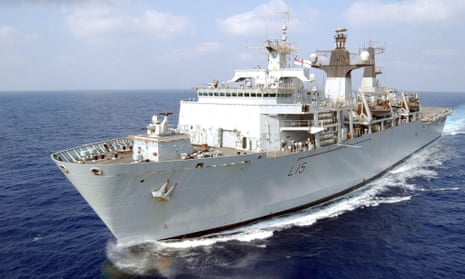The British navy’s flagship is poised to join a big migrant rescue operation in the Mediterranean as early as Tuesday after spending the weekend stuck in port amid a diplomatic spat over where rescued people should be disembarked and processed.
HMS Bulwark was dispatched by Prime Minister David Cameron for use in a pan-European attempt to save migrant lives, amid a public outcry over the record number of migrant drownings in the Mediterranean. Up to 900 people drowned in one weekend last month.
But the 176-metre-long vessel was stuck at anchor in Sicily and did not take part in a record-breaking weekend of search and rescue in which about 7,000 people were saved from dinghies and other unpromising vessels.
Involvement was held up by deliberations between the Italian and British foreign ministries. Britain, which agreed to send the ship after emergency EU talks last month, sought guarantees that the migrants rescued by HMS Bulwark could be taken to Italian ports once they are saved from the high seas.
One government source said British operations in the Mediterranean were expected to start on Tuesday.
A Royal Navy spokesman said earlier: “We’re working through with the Italians about how it may be used, and once we’ve got that agreement we’re there to work on search-and-rescue efforts.”
It is understood that the UK government was keen to secure assurances that international law would be upheld, dictating that rescued people should be taken to the nearest safe port, at which they would be able to claim asylum.
A Foreign Office spokesman said: “The prime minister was clear at the European council that Britain would be playing its role in tackling the current crisis in the Mediterranean but that our focus would be on saving lives, not offering people asylum in the UK.
“Discussions between EU partners remain ongoing to ensure close coordination and we are not going to speculate on any operational decisions at this stage.”
Migrant boats typically carry between 200-500 asylum seekers, with some packing in more than 700. Bulwark, which has the capacity to rescue hundreds of people – and did so during an evacuation of Britons from Lebanon in 2006 – would have been useful on a weekend in which lives were saved in record numbers by Italian ships.
Between Friday and Sunday, the Italian coastguard rescued at least 6,801 migrants from about 16 boats attempting to navigate the waters between Libya and Italy. This was equivalent to nearly nearly half the number rescued last May, a month which saw an unprecedented level of migration in the Mediterranean.
A baby was born on board one of the rescue ships after a pregnant woman went into labour within hours of leaving the Libyan coast, the Italian navy said. At least 10 migrants were discovered dead either on the crammed smuggling ships or in the sea.

The surge in trans-Mediterranean migration has been caused in part by the Libyan civil war, which has created a security vacuum in the country and allows people smugglers to work virtually unimpeded. But illegal boat journeys from Egypt have also continued, while trips from Turkey to Greece have tripled – underlining how wars and repression across the region continue to drive demand regardless of the war in Libya or the presence of rescue operations in the Mediterranean.
Abu Osama, a Syrian refugee who reached Italy by boat from Egypt last month, said he had been “determined to go, whether or not there is a rescue operation. I’m risking my life for something bigger, for ambitions bigger than this … If I fail, I fail alone. But by risking this, I might create life for my three children.”
In emergency meetings last month, European politicians promised military action against smuggling networks in Libya. The announcement was mocked by the smugglers, who wondered how foreigners could target such elusive networks that are tightly tied to the local economy.
“It’s been happening for years, these promises and threats,” said one, who called himself Hajj. “They’ll move on. What are they going to do, put two frigates here? Two warships? In Libyan waters? That’s an invasion.”
In addition to offering Bulwark, Britain has sent three Merlin helicopters to Sicily to help with reconnaissance operations.
A Ministry of Defence spokesman said: “HMS Bulwark and three Merlin helicopters are now ready to operate in the Mediterranean, working closely with the Italian Navy, and coordinated via Rome.
“The 19,000 tonne amphibious ship will work in tandem with the surveillance helicopters to provide a wide ranging search and rescue capability. The aircraft, from Royal Naval Air Station Culdrose, are currently stationed at the naval air station in Sigonalla, Sicily, to be called upon when needed by the Italian coastguard.
“Supported by over 80 UK personnel, including air and ground crew, they have commenced their first training sortie, to familiarise themselves with the area. From Tuesday, they will also begin flying operations with HMS Bulwark.”

Comments (…)
Sign in or create your Guardian account to join the discussion